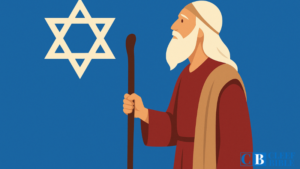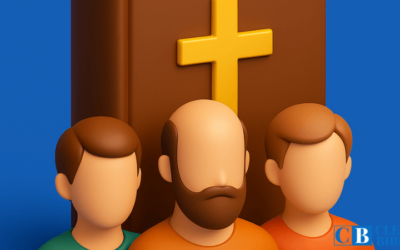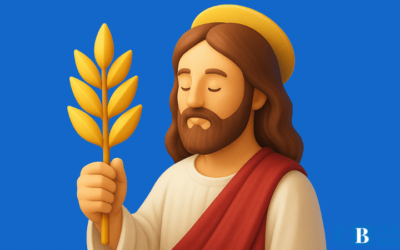What if the answers to the origin of the universe, life, and your purpose were in the first book of the Bible?
Have you ever wondered why we're here, how it all began, or if there's a purpose beyond what's visible?
Since the dawn of humanity, these questions have generated curiosity, debate, theories… and hope.
The surprising thing is that the Book of Genesis —the first text of the Bible— not only raises them, but offers powerful answers that are still relevant today.
Within its pages lie the foundations of the universe, the dignity of the human being, the root of evil, and the promise of redemption.
It's not just an ancient tale, but the starting point of an eternal story in which you too are included.
Get ready to find out why Genesis is not simply a beginning, but the complete framework of human history according to the mind and heart of God.
What does the word “Genesis” mean?
The word “Genesis” comes from the Greek genesis, which means “origin”, “beginning” or “birth”.
This title was taken from the Greek translation of the Old Testament, the Septuagint, where it is used to describe the beginning of all things: the universe, humanity, sin, redemption, and the people of God.
In Hebrew, the book is titled “Beresheet”, which literally means “In the beginning,” referring to the first words of the original text:
“In the beginning God created the heavens and the earth” (Genesis 1:1)
Both names perfectly capture the essence of the book: a story of fundamental beginnings that will mark the development of the entire biblical revelation.
Importance of the first book of the Bible
Genesis is the theological and narrative foundation of all Scripture.
It is not simply a prologue, but the foundation on which the great themes of the Christian and Jewish faith are built.
Key importance:
- Reveals God as sovereign Creator, eternal and personal.
- Explain the origin of sin and the need for redemption, narrating the fall of man.
- Presents the divine pacts that define the history of salvation, especially the covenant with Abraham.
- Introduces the concept of the image of God in the human being, giving dignity and purpose to existence.
- Establishes the genealogy and lineage that leads to the coming of Christ.
Without Genesis, the other books of the Bible would lose their context.
It is the beginning of God's redemptive history with humanity.
Its influence on theology, history and culture
The impact of the Book of Genesis goes far beyond the religious sphere.
Has profoundly influenced:
- Theology:
- The attributes of God as Creator, Judge and Redeemer.
- The doctrine of original sin and messianic hope.
- The basis of biblical monotheism.
- The story:
- Provides a theological view of human origins, ancient civilizations, and divine purpose in history.
- It is key to understanding the development of the people of Israel.
- The culture:
- Has inspired literature, painting, cinema, music and philosophy.
- Scenes such as creation, Eden, Noah's ark and the Tower of Babel are universal references.
- It has influenced concepts of law, marriage, ecology, justice and human dignity.
Genesis not only explains how it all began, but why everything exists, what is its meaning and where history is pointing from a God-centered worldview.
It is an ancient book with a message that continues to shape hearts, minds and civilizations.
Authorship and date of Genesis
Is Moses the traditional author of Genesis?
The Judeo-Christian tradition attributes the authorship of the Book of Genesis to Moses, along with the other four books that make up the Pentateuch (Exodus, Leviticus, Numbers and Deuteronomy).
This view has been held for centuries, based on:
- Biblical references to “the book of the law of Moses” (Joshua 8:31; 2 Chronicles 34:14)
- Words of Jesus and the apostles, who referred to Moses as the author of the law (John 5:46-47; Mark 12:26)
- The rabbinic tradition, which has always considered Moses as the mediator and recorder of divine revelation
Although Genesis does not directly mention Moses as its author, its coherence with the rest of the Pentateuch, its introductory function, and its transmission through the people of Israel reinforce this traditional authorship.
Internal arguments and historical evidence
Internally, Genesis shows a unified structure and thematic continuity suggesting the intervention of a primary author or compiler guided by God.
Arguments for Mosaic authorship include:
- Linguistic and stylistic connections between Genesis and Exodus
- The repeated use of expressions typical of the ancient Hebrew context
- A worldview consistent with the covenant theology that Moses taught the people of Israel
- The fact that Moses, as leader of the people and prophet, had access to both oral tradition and direct divine revelation
Historically, Jewish scribes and copyists preserved these texts from the desert period (around the 15th century BC), and considered them part of the Torah revealed through Moses.
Modern debates about its composition
In recent centuries, especially since the rise of rationalism and textual criticism, The Mosaic authorship of Genesis has been questioned.
One of the most influential theories has been the Documentary Hypothesis, which proposes that the Pentateuch was written from multiple sources (known as J, E, D and P) compiled later by unknown editors.
Their arguments include:
- Different names for God in parallel passages (YHWH and Elohim)
- Alleged narrative repetitions and contradictions
- Various literary styles
However, this theory has been heavily criticized for its arbitrary assumptions and lack of solid textual evidence.
Many conservative scholars argue that Literary variety reflects narrative richness and not multiple authors.
The current, more balanced position recognizes that Moses could have received oral traditions or ancient writings, and under divine guidance organized and wrote them in the form we know today as Genesis.
In this sense, The final authority of the text lies not in its composition process, but in its inspiration by God.
Literary structure of Genesis
Division between Genesis 1–11 and Genesis 12–50
The Book of Genesis is clearly divided into two main sections:
- Genesis 1–11: “Early History”
- It tells of the origins of the universe, humanity, sin, judgment, and nations.
- It includes the stories of creation, Eden, Cain and Abel, the Flood and the Tower of Babel.
- It has a universal and cosmic approach.
- Genesis 12–50: “Patriarchal History”
- It focuses on the patriarchs of Israel: Abraham, Isaac, Jacob and Joseph.
- It tells of God's covenant with Abraham and the development of the chosen people.
- It has a particular, descendant, genealogical and messianic focus.
This division is not only narrative, but also theological:
From the universal fall to the beginning of specific redemption.
From fallen humanity to a family called to bless all nations.
The use of genealogies and narrative accounts
A key feature of Genesis is its combination of vivid narratives and accurate genealogical lists.
This style fulfills multiple functions:
- Provides historical continuity: connects characters and events across generations.
- Mark thematic transitions: genealogies introduce new sections of the book.
- Affirms historicity: presents the characters not as myths, but as part of a royal lineage.
- Reinforces the theological purpose: shows how God works through a specific line to carry out His plan of redemption.
Examples of key genealogical sections:
- Genesis 5: From Adam to Noah
- Genesis 10: Table of Nations
- Genesis 11: From Shem to Abraham
- Genesis 36: Descendants of Esau
- Genesis 46: Sons of Jacob who went to Egypt
These genealogies are interspersed with profound narratives that reveal God's relationship with humanity, combining historical realism with theological intent.
It is a structure designed to teach, remind and reveal.
Main themes of the Book of Genesis
The creation of the world and humanity
Genesis begins with a momentous statement:
“In the beginning God created the heavens and the earth” (Genesis 1:1)
This first topic establishes that God is the absolute origin of all reality, and that creation is not an accident, but the result of His sovereign will.
Through six days of creative activity, God forms the universe, the earth, living beings and finally the human being, whom he creates. in His image and likeness (Genesis 1:27).
Key aspects:
- The world is good by design, not by chance.
- The human being has intrinsic value and purpose: to rule, multiply, and reflect God.
- The seventh day introduces the concept of sacred rest, foundation of the Sabbath.
The theme of creation in Genesis not only explains the origin of the cosmos, but the divine intention behind all existence.
Sin, judgment, and promise
Despite the perfect design, humanity chooses to rebel.
In Genesis 3, Adam and Eve disobey God's command, bringing with them sin, death, and a broken relationship with the Creator.
This pattern is repeated in the following generations:
- Cain kills Abel
- Evil multiplies before the Flood
- Men build the Tower of Babel to aggrandize themselves
Each episode shows that human sin has real consequences, but also that God does not abandon His redemptive purpose.
In the midst of judgment, God gives promises of restoration:
- Genesis 3:15: The “seed of the woman” who will overcome the serpent
- Genesis 6:18: Covenant with Noah
- Genesis 12:3: Blessing for all nations through Abraham
Genesis presents a cycle of sin, judgment, and grace, where divine faithfulness stands out in the face of human rebellion.
God's covenant with Abraham and his descendants
One of the most decisive themes of the book is the establishment of the covenant with Abraham, which marks the formal beginning of the plan of redemption through a chosen people.
God calls Abraham and promises him:
- A land (Canaan)
- A offspring numerous
- A universal blessing“In you all the families of the earth will be blessed” (Genesis 12:3)
This covenant is reaffirmed in Genesis 15, 17, and 22, and continues with his son Isaac, his grandson Jacob (renamed Israel), and the 12 sons who would form the tribes of God's people.
Through this covenant, Genesis shows:
- That salvation is divine initiative
- That God's plan unfolds through history
- That obedient faith, like Abraham's, is the correct response to God's promise
This theme connects directly with the New Testament, where Jesus is identified as the fulfillment of that promise (Galatians 3:16).
The first eleven chapters: Early Genesis
Creation (Genesis 1–2)
The first two chapters of Genesis present two complementary stories of creation.
- Genesis 1: A panoramic and structured view of the cosmic order
- Genesis 2: An intimate focus on the creation of human beings and their environment
Together, they reveal:
- A God who creates with power, intention and beauty
- A humanity placed in Eden, with moral and vocational responsibility
- The institution of marriage as God's original design
Here the foundations of the Judeo-Christian faith are established: the authority of God, the goodness of creation, and the dignity of the human being.
The Fall of Man (Genesis 3)
Chapter 3 marks a dramatic turn.
The serpent tempts Eve, who eats the forbidden fruit with Adam.
This act of disobedience breaks communion with God and introduces sin, suffering and death into the world.
Consequences:
- Curse on the earth, work, motherhood and the serpent
- Expulsion from Eden
- Beginning of redemption: the promise of the “seed” who will wound the serpent (Genesis 3:15)
The Fall not only explains the human condition, but the urgent need for a Savior.
The Flood and Noah (Genesis 6–9)
As humanity multiplies, so does its corruption.
God decides to judge the world through a great flood, but spares Noah, a righteous man, along with his family and a sample of every animal species.
Featured Topics:
- God's judgment as a response to persistent evil
- Noah's obedience as an example of faith
- The ark as a symbol of salvation
- The rainbow as a sign of covenant: God will not destroy the earth again by water
This story shows that Divine justice does not annul mercy, and Faith can preserve life even in the midst of judgment.
The Tower of Babel (Genesis 11)
The narrative culminates with the story of the Tower of Babel, where humanity attempts erect a tower that reaches the sky to become famous and not be dispersed.
God responds by confusing their languages and scattering them across the earth.
Key lessons:
- Human self-sufficiency and pride are contrary to God's purpose.
- Unity outside of divine will leads to ruin
- God continues to direct history, even when men try to control it.
This event sets the stage for the call of Abraham in Genesis 12, which begins the redemptive plan centered on faith, obedience, and divine promise.
Patriarchs and Promises: Genesis 12–50
Abraham, the father of faith
Abraham's story begins in Genesis 12, when God calls him to leave his homeland and promises him a nation, a land, and a global blessing.
Abraham respond with faith, and that faith becomes the model for all believers.
Key moments:
- His obedience in leaving Ur without knowing where he was going (Genesis 12:1–4)
- The covenant ratified by God in Genesis 15, where righteousness is credited to him by faith
- Abram's name change to Abraham, and the sign of the covenant: circumcision (Genesis 17)
- The ultimate test: the sacrifice of Isaac (Genesis 22), where Abraham demonstrates absolute trust in God
Abraham is central not only to Judaism, but also to Christianity and Islam, and is remembered as the father of faith par excellence (Romans 4; Hebrews 11).
Isaac and his role in the continuity of the covenant
Isaac, the son promised to Abraham and Sarah, represents the confirmation that God keeps his promises.
Although his story is less extensive than that of his father or his son Jacob, Isaac has a fundamental role:
- Reaffirms the Abrahamic covenant (Genesis 26:3–5)
- Live a life of obedience and faithfulness in the midst of difficulties
- It is a figure of the Messiah when he is taken to the mountain by his father in Genesis 22
Isaac symbolizes the continuity of God's plan through generations, demonstrating that He is faithful beyond times and circumstances.
Jacob, Israel and their 12 sons
Jacob, the son of Isaac, is a complex figure: cunning, fighter, transformed by God.
His story reflects divine grace that transforms human imperfection into redemptive purpose.
Highlights:
- He obtains the birthright and the blessing, although through deception (Genesis 25 and 27)
- Dream of a ladder that connects heaven and earth (Genesis 28)
- He fights with an angel and receives a new name: Israel (Genesis 32)
- He has 12 children, who become the 12 tribes of Israel
Through Jacob, we see that God chooses, corrects and forms to those who will be an essential part of His people.
The story of Joseph and God's purpose in suffering
Joseph, the son of Jacob and Rachel, occupies the last 13 chapters of Genesis.
His story is a master class in providence, integrity and forgiveness.
Key moments:
- He is sold by his brothers and taken to Egypt as a slave.
- In Potiphar's house and in prison, he maintains his fidelity to God
- He interprets dreams and rises to second place in Egyptian power.
- He forgives his brothers and saves his family from hunger.
The key phrase that sums up his story is:
“You intended evil against me, but God intended it for good” (Genesis 50:20)
Joseph embodies how Suffering can be part of God's plan to preserve lives and fulfill greater purposes.
Genesis and Biblical Theology
God as Creator and Redeemer
Genesis presents God as the absolute protagonist:
He creates, calls, judges, blesses and restores.
Two key aspects of His character emerge strongly:
- Creator: designs the universe with order, beauty and purpose
- Redeemer: pursues fallen humanity and establishes a path of salvation
From Eden to the covenant with Abraham, Genesis reveals to a God committed to the restoration of the world, a theme that will run throughout Scripture.
Original sin and messianic hope
Sin enters the scene in Genesis 3, and with it, the separation between God and humankind.
However, even at the moment of greatest rupture, God declares a prophetic promise:
“And I will put enmity between you and the woman… he will bruise your head, and you will bruise his heel.” (Genesis 3:15)
This verse is known as the protoevangelium, he first announcement of the Messiah, who will defeat evil and restore what was lost.
Genesis teaches us that although sin is real and devastating, hope is present from the beginning.
Divine sovereignty in history
A constant throughout Genesis is the God's sovereignty over people, events, and nations.
Nothing escapes His control, not even sin, betrayal, or suffering.
Powerful examples:
- The choice of a barren man (Abraham) to found a nation
- The use of famine to reunite Jacob's family in Egypt
- The fact that Joseph's rejection by his brothers becomes the way to family salvation
Genesis teaches that God is writing a story bigger than ours, and that we can trust His plan, even when we don't fully understand it.
Literary genres present in Genesis
Historical narratives
The bulk of Genesis is made up of detailed historical narratives, written with precision and richness of characters.
These stories:
- They are not myths, but stories with a theological intention and genealogical basis.
- They describe real events starring imperfect people
- They have a solid literary structure, with introduction, climax and resolution
Every story seeks show who God is and how he acts in human history.
Poetry implicit in creation
Genesis 1 has a structure that many consider poetic and highly symbolic:
- Rhythmic repetition (“And God said… And there was evening and there was morning…”)
- Structural parallelism (days 1–3 create space, days 4–6 fill it)
- Use of numbers and symmetries (the number 7 appears repeatedly)
Although it is not poetry in the strict sense, The style highlights the majestic, intentional and orderly character of the creation.
This literary form invites contemplation and reverence.
Prophecies and typologies
Genesis is full of direct prophecies and images that point to Christ and the redemptive plan.
Key examples:
- Genesis 3:15 – the promise of the redeemer
- Genesis 22 – Isaac as a figure of Christ, the sacrificed son
- Genesis 37–50 – Joseph as a type of Christ: rejected, exalted, and redeemer of his people
These typologies are not coincidences, but prophetic echoes which show that from the beginning, God was preparing the arrival of the Savior.
In short, Genesis not only recounts events, but interprets them from a divine perspective, showing that all history points to Christ.
Key Symbolisms in the Book of Genesis
The Garden of Eden
The Garden of Eden is not just a physical place; it is a symbol of God's original design for humanity:
a space of communion, harmony and purpose.
Symbolisms of Eden:
- The direct presence of God with man (Genesis 3:8)
- The effortless abundance, which represents the perfect provision
- He moral mandate: freedom with limits, demonstrating human responsibility
Eden symbolizes the ideal state of creation, the lost paradise that will be restored at the end of the Bible (Revelation 22), closing the narrative cycle that began in Genesis.
The tree of life and knowledge
Within Eden, two trees have a deep theological weight:
- The tree of life: symbol of immortality, continuous communion with God and eternal fullness
- The tree of the knowledge of good and evil: represents moral freedom, responsibility, and the temptation to decide good and evil without God
When Adam and Eve eat the forbidden fruit, They do not just disobey a mandate, but They break the relationship of dependence with the Creator.
Access to the tree of life is then blocked, showing that Eternal life requires reconciliation with God.
The rainbow as a sign of covenant
After the Flood, God establishes a new covenant with Noah and all creation, promising that He will never again destroy the earth with water.
The sign of this covenant is the rainbow (Genesis 9:12–17), which symbolizes:
- God's faithfulness to his promises
- The divine patience in the face of human sin
- The reboot of humanity under a new beginning
The rainbow is, since Genesis, a visual display of divine commitment to mercy, a promise that remains valid for every generation.
The Book of Genesis in the context of the Pentateuch
Relationship with Exodus, Leviticus, Numbers and Deuteronomy
Genesis is the first book of the Pentateuch, also known as the Torah or the five books of Moses.
It serves as historical and theological introduction to the themes developed in later books:
- Genesis establishes the origin of humanity and the people of Israel
- Exodus develops the liberation and the covenant at Sinai
- Leviticus explains the laws of holiness and worship
- Numbers narrates the pilgrimage and the challenges of the desert
- Deuteronomy reaffirms the covenant before entering the Promised Land
Genesis provides the genealogical, spiritual and prophetic basis of the entire story of the Pentateuch.
Narrative and theological continuity
From Adam to Joseph, Genesis prepares the ground for the promises, commandments, and purposes that God will reveal later.
Examples of continuity:
- The covenant with Abraham expands at Sinai
- The promise of land begins with Canaan and continues with the conquest
- The promised offspring leads to a nation, Israel
- The pattern of sin, judgment, and grace is repeated throughout the Pentateuch
Theologically, Genesis introduces the sovereignty, justice, grace, and faithfulness of God, fundamental principles that will guide the entire history of Israel.
Introduction to the history of Israel
Genesis chapters 12 to 50 They function as the founding history of the people of Israel.
Through the patriarchs—Abraham, Isaac, Jacob, and Joseph—it is revealed:
- He call of a holy nation
- The model of faith, obedience and struggle with God
- The context that leads Israel to settle in Egypt, preparing the ground for the Exodus
Genesis teaches that Israel is not born by chance or human merit, but by divine election and redemptive purpose.
Influence of the Book of Genesis on the New Testament
References of Jesus and the apostles to Genesis
Jesus and the New Testament writers do numerous references to Genesis, which confirms its authority and doctrinal relevance.
Examples:
- Jesus speaks about marriage based on Genesis 1 and 2 (Matthew 19:4–6)
- He refers to Abel as the first martyr (Luke 11:51)
- Mentions Lot and the destruction of Sodom (Luke 17:28–32)
- Paul uses Abraham as a model of faith (Romans 4)
These references show that The New Testament interprets Genesis literally and as a theological foundation.
Adam as a figure of Christ
Paul establishes a typology between Adam and Christ, showing them as the two great representatives of humanity.
“For as in Adam all die, so in Christ all will be made alive.” (1 Corinthians 15:22)
Comparison:

This comparison reinforces that Genesis It is not an isolated story, but part of the structure of salvation culminated in Jesus.
The fulfillment of promises on the cross
The promises given to Abraham in Genesis find their final fulfillment in Christ.
“And to Abraham were made the promises… and to his seed, which is Christ.” (Galatians 3:16)
Since Genesis, God promised:
- A descendant that would bless the nations
- An eternal covenant
- A complete restoration
Jesus is the promised seed, the true son of Abraham, the fulfillment of the protoevangelium, and the means by which the whole earth is blessed.
The New Testament interprets Genesis as the prophetic root of the Gospel.
Genesis and Science: Creationism vs. Evolution
Interpretations of the creation story
The creation story in Genesis 1 has been interpreted in various ways throughout history.
These interpretations not only influence the Christian worldview, but also the dialogue with science.
Main approaches:
- Literal (young-earth) creationism: holds that God created the world in six literal 24-hour days, approximately 6,000 to 10,000 years ago.
- Progressive creationism: interprets “days” as long, indefinite periods of time, allowing for greater compatibility with scientific data.
- Intelligent design: claims that the universe shows evidence of design, although without setting a strict chronology.
- Theistic creationism: accepts much of the evolutionary model, but maintains that God directed the process.
- Literary or symbolic interpretation: He sees the text as theologically true, but not necessarily scientific; he emphasizes its poetic structure and doctrinal purpose.
All these visions seek to answer: What did God want to communicate through this story?
Debates over literal days vs. symbolic eras
One of the most discussed controversies is whether the “days” of Genesis 1 should be understood as 24 literal hours or as metaphors of prolonged stages.
Arguments for literal days:
- The use of the Hebrew term yom together with “evening and morning” suggests a natural sequence of days.
- Exodus 20:11 links literal creation with the work week.
- The narrative is clear and without any hint of explicit symbolism.
Arguments in favor of a symbolic reading:
- Before the fourth day there is no sun, therefore there is no measurement of time as we know it.
- Yom It is also used elsewhere in the Bible to mean non-literal periods.
- The main focus seems to be theological and structural, not chronological.
Both positions can coexist within the framework of faith, as long as it is recognized divine authorship and the revelatory purpose of the text.
Christian positions regarding modern science
Christians take different positions regarding scientific advances concerning the origin of the universe and life:
- Direct rejection: a literal view is maintained and theories such as evolution or the Big Bang are rejected.
- Compatibilism: Many believers believe that science and faith do not contradict each other, but rather answer different questions (how vs. why).
- Creative integration: Some seek to harmonize scientific data with a non-literal interpretation of the biblical text.
In all cases, the central point is to affirm that:
- God is the Creator, whether by direct means or by orderly processes.
- The human being was created in the image of God, with purpose, dignity and destiny.
- The Genesis story does not seek to explain modern science, but to reveal the spiritual truth about the origin and purpose of the world.
Practical teachings from the Book of Genesis for today
The dignity of the human being created in the image of God
Genesis 1:27 states that man and woman were created in the image and likeness of God.
This statement has profound practical implications:
- Every human being, regardless of age, gender, race or condition, possesses inherent dignity.
- No life is accidental: We were all created with divine intention.
- The image of God calls us to live with responsibility, creativity, morality and love.
In a world that degrades human life, Genesis reminds us that each person reflects the Creator.
The importance of family and fidelity
From the very first chapters, Genesis presents God's original design for family life:
- Union between a man and a woman (Genesis 2:24)
- Fruit of that union: children, generations, legacy
- Call to fidelity, mutual protection, and purposeful multiplication
Although the patriarchs faced family challenges, the message is clear: The family is part of God's plan and must be cared for with love, truth and commitment.
God uses imperfect people to fulfill his plans
One of the great lessons of Genesis is that God does not choose the perfect, but the available.
- Abraham hesitated
- Jacob was deceitful
- Joseph was betrayed
- Everyone faced mistakes and failures
And yet, God used each one of them to carry out its purpose.
That means that today he can also use us, with our weaknesses, if we are willing to obey.
Genesis teaches that The protagonist of the story is not man, but God, and He continues to work with sovereign grace.
How to Study the Book of Genesis Effectively
Reading plans and thematic sections
Studying Genesis effectively requires structuring your reading. Some suggestions:
- 30-day plan: one chapter per day + thematic summary
- Reading by sections:
- Genesis 1–11: Origins of Humanity
- Genesis 12–25: Abraham
- Genesis 25–36: Isaac and Jacob
- Genesis 37–50: Joseph
You can also read in parallel with the New Testament to identify prophetic and doctrinal connections.
Guide questions for each chapter
As you read each chapter, ask yourself thought-provoking questions:
- What does this text reveal about the character of God?
- How does the human being respond to God?
- What principles can I apply today?
- Where does grace or judgment appear in this story?
These questions help move from superficial reading to deep, transformative understanding.
Supplementary resources and biblical commentaries
For a more complete study, the following are recommended:
- Study Bibles such as the NIV, Reina-Valera with notes, or the MacArthur Study Bible
- Biblical commentaries such as those of Warren Wiersbe, Charles Ryrie, or Matthew Henry's Expository Commentary
- Maps and timelines, to view events chronologically
- Devotional guides and explanatory videos, which help to contextualize
Studying Genesis is not just reading the past, but discover the eternal character of God in action from the beginning.
Genesis in art, music and literature
Famous works inspired by creation and Eden
The story of creation and Eden has been one of the most influential sources in the history of Western art.
From the Middle Ages to the Renaissance and the contemporary era, Genesis has been captured in works that have shaped the collective perception of the origin of the world.
Notable examples:
- The Creation of Adam – Michelangelo (Sistine Chapel): represents the moment when God gives life to man, one of the most recognizable icons of sacred art.
- The Garden of Earthly Delights – Bosch: a complex visual allegory of Eden, sin and the final judgment.
- The creation of the world – Joseph Haydn: a musical oratorio that translates Genesis 1 into majestic symphonic music.
- Paradise Lost – John Milton: epic poem that narrates the fall of Adam and Eve, with profound theological and philosophical implications.
These expressions show that Genesis transcends religion and permeates culture as a universal narrative of beginning, fall, and the search for a return to wholeness.
The figure of Adam and Eve in visual culture
Adam and Eve are not only biblical characters, but cultural symbols of humanity itself.
They have been represented as:
- The ideal of the human being created by God
- Archetypes of lost innocence
- Examples of free will and its consequences
From paintings, sculptures and films to modern advertising, his image has been reinterpreted time and again, reflecting the internal struggle of man to understand his origin, his guilt and his redemption.
The archetype of the hero's journey in Joseph
The story of Joseph, one of the most complete accounts of Genesis, It has been considered a classic example of the “hero’s journey”, as described by Joseph Campbell.
Present stages:
- Call to travel: rejected by his brothers
- Fall and transformation: sold into slavery and imprisoned
- Ascent and redemption: comes to power in Egypt
- Reconciliation: forgives his brothers and saves his family
This pattern makes him an inspiration for novels, films and moral teachings, showing how suffering may be part of God's sovereign plan to accomplish a greater purpose.
Relevance of Genesis for the contemporary world
What does Genesis say about the origin and purpose of life?
In an age of existential confusion, Genesis answers clearly:
- The universe has a Creator: We do not come from chaos, but from design.
- The human being has value and purpose: was created to relate to God and care for creation.
- The world was made “very good”: Life is not absurd, but has direction and meaning.
In the face of a culture that preaches nihilism or materialism, Genesis proclaims an eternal truth: we were created with intention and love.
The problem of evil and the justice of God
Genesis also addresses the origin of moral evil and its consequences.
Sin is not an accident or a social product, but a voluntary rupture of the relationship with God.
Through the Fall, the Flood, and the Tower of Babel, the book shows:
- That evil has real consequences
- That God does not ignore sin, but neither does He abandon the sinner
- That His justice is always accompanied by grace
Genesis answers one of humanity's greatest dilemmas:
Where is God when there is evil?
And it shows us that He is acting from the beginning to redeem us.
Can the message of Genesis answer current questions?
Absolutely.
Genesis remains relevant because It speaks of the human heart, of our search for identity, community, purpose and hope.
Answer questions like:
- Where do we come from?
- Why is the world broken?
- Does my existence have meaning?
- Is there hope for humanity?
In a world full of noise, The message of Genesis offers direction, restoration, and foundation.
It is much more than an old book: it is the opening of the great eternal story of God's love for humanity.
📗 Book recommendations on the Book of Genesis (Amazon)
📘 “Genesis: A Commentary” – R. Kent Hughes
A clear, practical, and expository commentary, ideal for leaders, teachers, or students who want to understand Genesis chapter by chapter, with pastoral applications.
📘 “Creation and Genesis” – John C. Lennox
A rational defense of the creation story against modern science. Lennox, a mathematician and theologian, offers a balanced view of faith and reason.
📘 “Genesis: The Book of Beginnings” – Charles Ryrie
A concise and theologically sound overview of Genesis. Ryrie explores key doctrinal themes and presents the text in a way that is accessible to any reader.
Frequently Asked Questions about the Book of Genesis
Who wrote the book of Genesis?
The Judeo-Christian tradition holds that Moses He was the author of Genesis, along with the other four books of the Pentateuch. Although the text does not mention the author directly, both the Old and New Testaments recognize Moses as the legislator and scribe who received and transmitted divine revelation.
What does the word “Genesis” mean?
“Genesis” comes from the Greek genesis, what does it mean origin, beginning or birthIn Hebrew, the book is titled Bereshit, which means "In the beginning," referring to the first verse of the text. Both words reflect the introductory nature of the book: the beginning of the universe, humanity, and God's redemptive plan.
How many chapters and verses does Genesis have?
The Book of Genesis has 50 chapters and a total of 1,533 versesThese chapters span from the creation of the world to the death of Joseph in Egypt, serving as a historical and spiritual prologue to the entire Bible.
What is the main purpose of the book?
The purpose of Genesis is show the origin of all things under the sovereignty of God, reveal the fall of humanity and establish the basis of the plan of redemption through the covenant with Abraham. It is the theological foundation upon which the entire biblical narrative is built.
Does Genesis contradict modern science?
It depends on the interpretation. Some believe that the creation story is literal and chronological, while others understand it as symbolic or theologicalMany Christians claim that faith and science can coexist, since Genesis answers the “why” of creation, while science seeks the “how.”
Why is the creation story so important?
Because it defines fundamental concepts such as:
- That God is the supreme Creator
- That creation is good and purposeful
- That the human being was created in the image of God
- That there is a moral structure from the beginning
The story of creation establishes the origin of human identity, morality and spirituality.
What is the difference between the story in Genesis 1 and Genesis 2?
Genesis 1 offers a global and orderly vision of creation in six days, focusing on the progression of the universe.
Genesis 2 offers a intimate and detailed approach about the creation of man, woman, and the Garden of Eden. The two stories are complementary, not contradictory, and together they offer a complete picture of the origins.
What practical lessons does Joseph's story offer?
The story of Joseph teaches about:
- Perseverance in adversity
- Faithfulness to God in the midst of injustice
- Forgiveness to those who have hurt us
- How God uses suffering to fulfill His purpose
Joseph is an example of how God can transform evil into good and use a person's life to preserve and redeem many.
Should Genesis be interpreted literally or symbolically?
Both readings have been adopted by different believers.
Some read it literally as an accurate historical account; others see it symbolically, focused on theological messages. The most important thing is to recognize that Genesis is the inspired Word of God and seeks to reveal His character, His purpose, and His plan for humanity.
How does Genesis connect to the history of redemption?
Genesis is the beginning of the plan of redemption. In it:
- Sin enters the world (Genesis 3)
- The first promise of the Savior is announced (Genesis 3:15)
- God chooses Abraham and promises descendants who will bless all nations (Genesis 12)
All of this points to Jesus, the fulfillment of those promises.
That's why, Genesis not only looks back, but points forward to the cross and the final restoration.
Conclusion
The Book of Genesis is not just a collection of ancient stories, but the living root of our understanding of the world, of God, and of ourselves.
From the creation of the universe to the story of Joseph in Egypt, each chapter reveals that human history has an author, a purpose, and a hope.
It reminds us that we were not created by accident, that evil will not have the last word, and that God is writing a story of redemption from the beginning.
Genesis confronts us with great truths: human dignity, moral responsibility, the power of forgiveness, and the faithfulness of a God who never abandons His plan.
Today more than ever, we need to go back to the beginning to understand our present.
And you, what part of the Book of Genesis impacts or challenges you the most?
Leave me your comment and let's share together how this ancient book continues to transform lives in our time.
Discover How the Bible Can Transform Your Life
- Bible Study – explore the teachings of the Bible and find answers to life’s challenges.
- Fundamental Beliefs – delves into the principles that have guided millions through the centuries.
- Spiritual Growth – Strengthen your faith with studies designed to bring you closer to God.

Discover How the Bible Can Transform Your Life
- Bible Study – explore the teachings of the Bible and find answers to life’s challenges.
- Fundamental Beliefs – delves into the principles that have guided millions through the centuries.
- Spiritual Growth – Strengthen your faith with studies designed to bring you closer to God.



























0 Comments